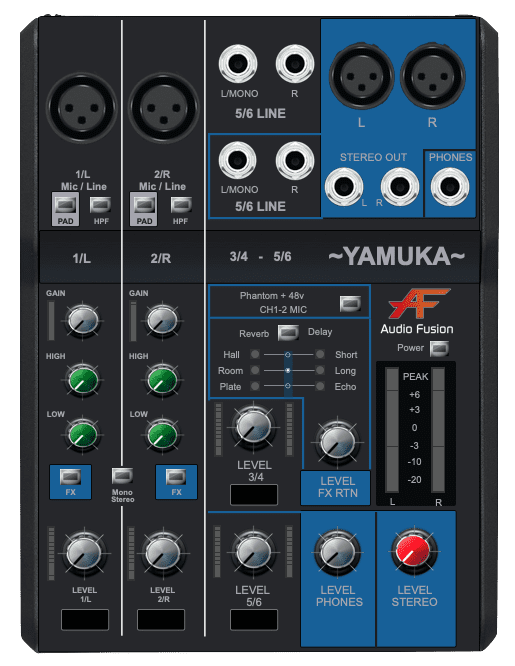- Accounts
-
Shop
- Bundle / School Shop
- Personal Shop
-
SoundcheckPro
- Getting Started
- Session Mode
- Console Operation
- Audio Effects
- Education
- Advanced Functions
- Troubleshoot
- Xena Mixer
- Yamuka Mixer
- Maggie Mixer
- Zedd Mixer
- DG32 Digital Mixer
- SteeV88
- Audyssey Console
- Xena Web App
- EDU Portal
- Virtual Studio XR
Yamuka FX Sends
- Docs
- SoundcheckPro
- Yamuka Mixer
- Yamuka FX Sends
Background
FX sends, also known as auxiliary sends or aux sends, are commonly used in audio production to apply effects, headphone or monitor mixes.
An FX Send is a routing option on a mixer that allows you to send a copy of a track’s signal for separate processing (through an FX bus) where you can add various time-based effects such as reverb & delay.
FX sends are also useful for creating a sense of space and depth in a mix by applying effects to only certain parts of a track, like a vocal or guitar solo. By using an FX send, you can add just the right amount of effect to enhance the sound without overwhelming it or making it sound unnatural.

Use Cases
- Adding effects like Reverb & Delay
- Creating a headphone mix
- Route a sub mix to stage monitors or other destinations
How to use FX sends?
Prerequisites
- Load audio files in the “File Player” window
- Push play, verify the meters (no sound yet)
- Raise the INPUT knob (mono channel, skip for stereo channels)
- Raise the MAIN knob verify meters and output
Steps
- EnGage the FX SWITCH
- Tweak the on-board audio effects
- Raise the LEVEL FX RTN knob
FX Send Gain
To set up an FX send, adjust the level of the send for each track, which determines how much of the original signal is sent to the FX bus. The levels sent to the FX bus are POST FADER. Meaning, the signal sent to the FX bus won’t be send if the channel level is down.
Audio Effects
Units that process sound such as, reverb & delay. The signals feeding the FX BUS exit the mixer at a designated output connector which feeds a series of effect units.
FX Returns
An FX Return is where the audio signal from th various effects comes back onto the mixer. Once the processed audio signal is brought back into the mix, you can adjust its volume of the returned signal and blend it with the original audio signal to create the desired effect.
Blending FX with the Source
Adjust the levels of FX Return levels and the channel levels to create a sense of spacial depth. Too much effects signal can be overwhelming. Too little of the effect it could be unperceived. The perfect blend will create a more polished sound.